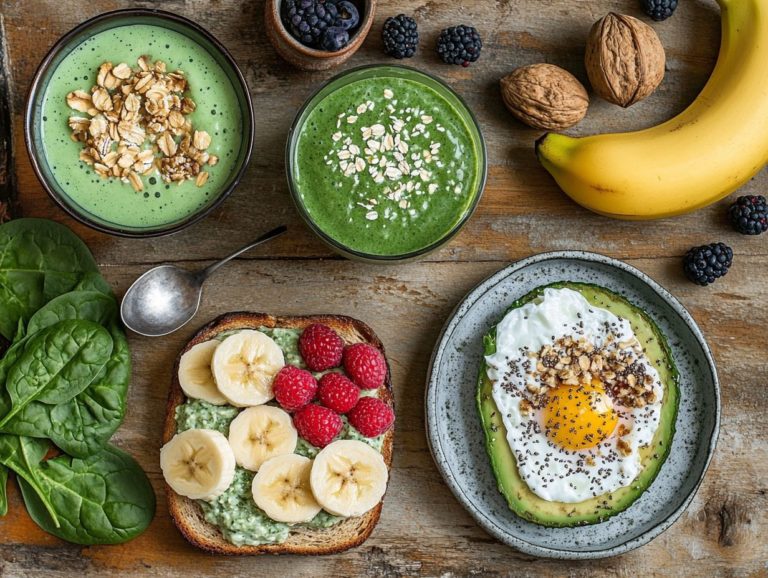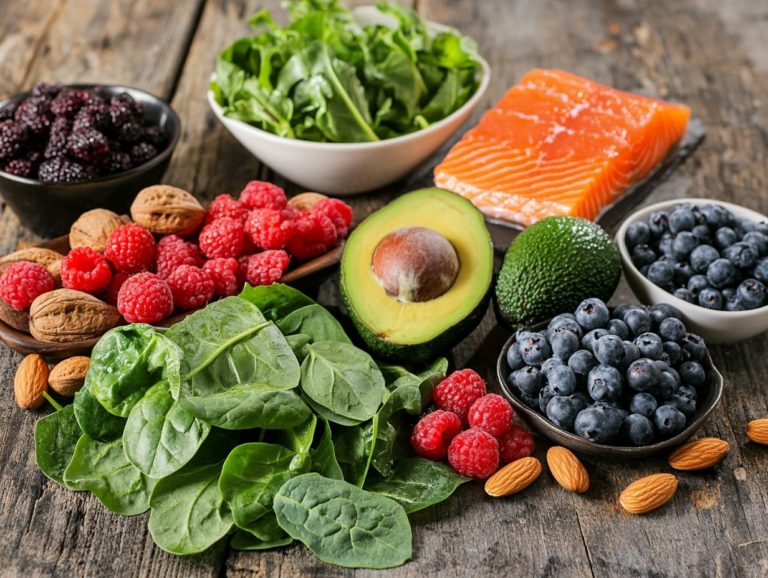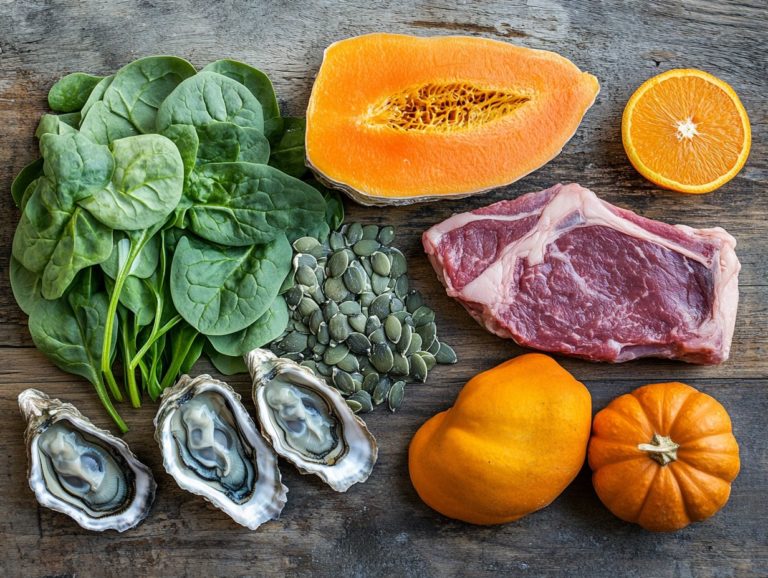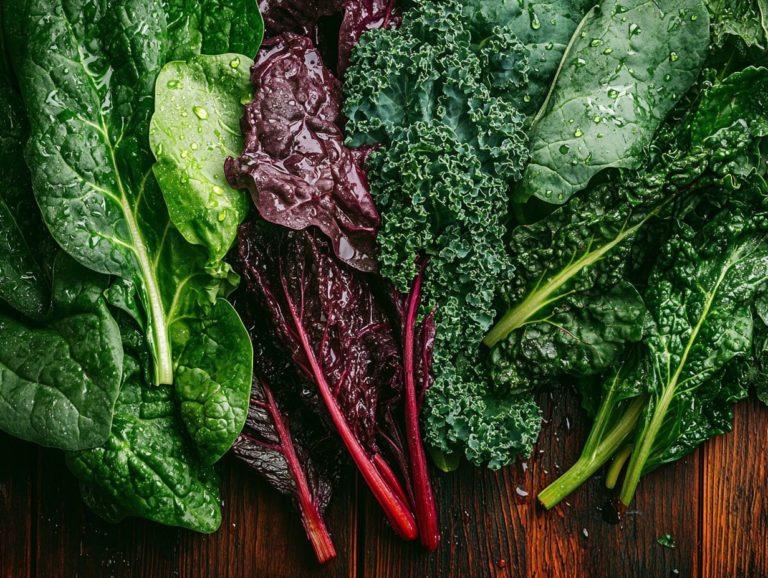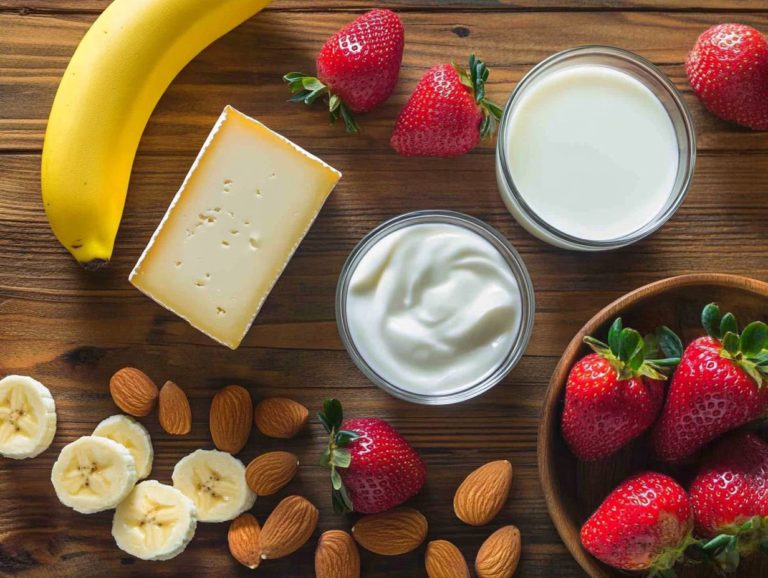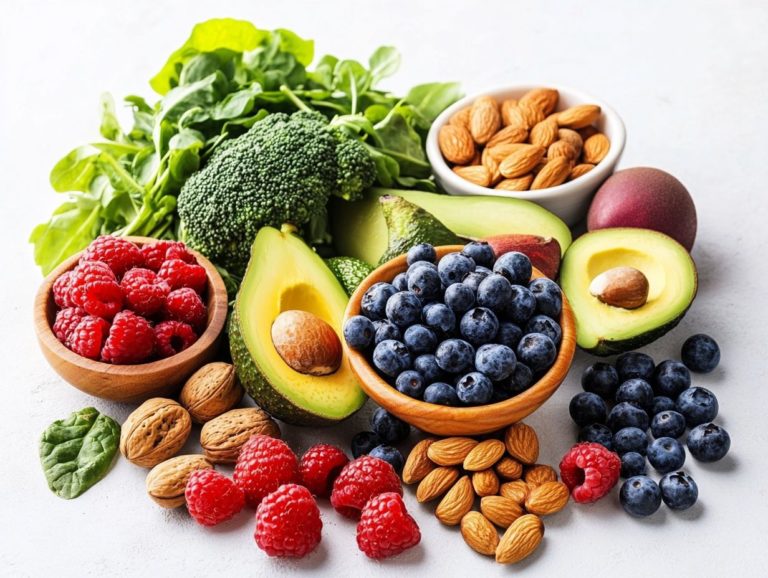5 Foods Rich in Vitamin C for Immunity
Vitamin C is a powerhouse nutrient that plays a vital role in bolstering your immune system and enhancing your overall health.
With its remarkable antioxidant properties, it safeguards your body against illness while also promoting skin health and aiding in collagen formation.
You re about to discover five delicious foods that are rich in vitamin C everything from the citrusy zing of oranges to the vibrant crunch of red bell peppers.
We ll delve into daily vitamin C requirements, highlighting its significance for immunity. Plus, we ll provide you with easy ways to incorporate these nutritious foods into your diet with simple recipes.
Get ready to boost your health and enjoy tasty new meals!
Contents
- Key Takeaways:
- 1. Oranges
- 2. Strawberries
- 3. Kiwi
- 4. Red Bell Peppers
- 5. Broccoli
- How Much Vitamin C Do You Need Daily?
- Frequently Asked Questions
- What are five immune-boosting foods rich in vitamin C?
- How does Vitamin C help boost the immune system?
- Can consuming Vitamin C-rich foods prevent colds and flu?
- Are there other benefits of consuming foods rich in Vitamin C?
- How much Vitamin C should I consume in a day?
- Can I take Vitamin C supplements instead of consuming Vitamin C-rich foods?
Key Takeaways:
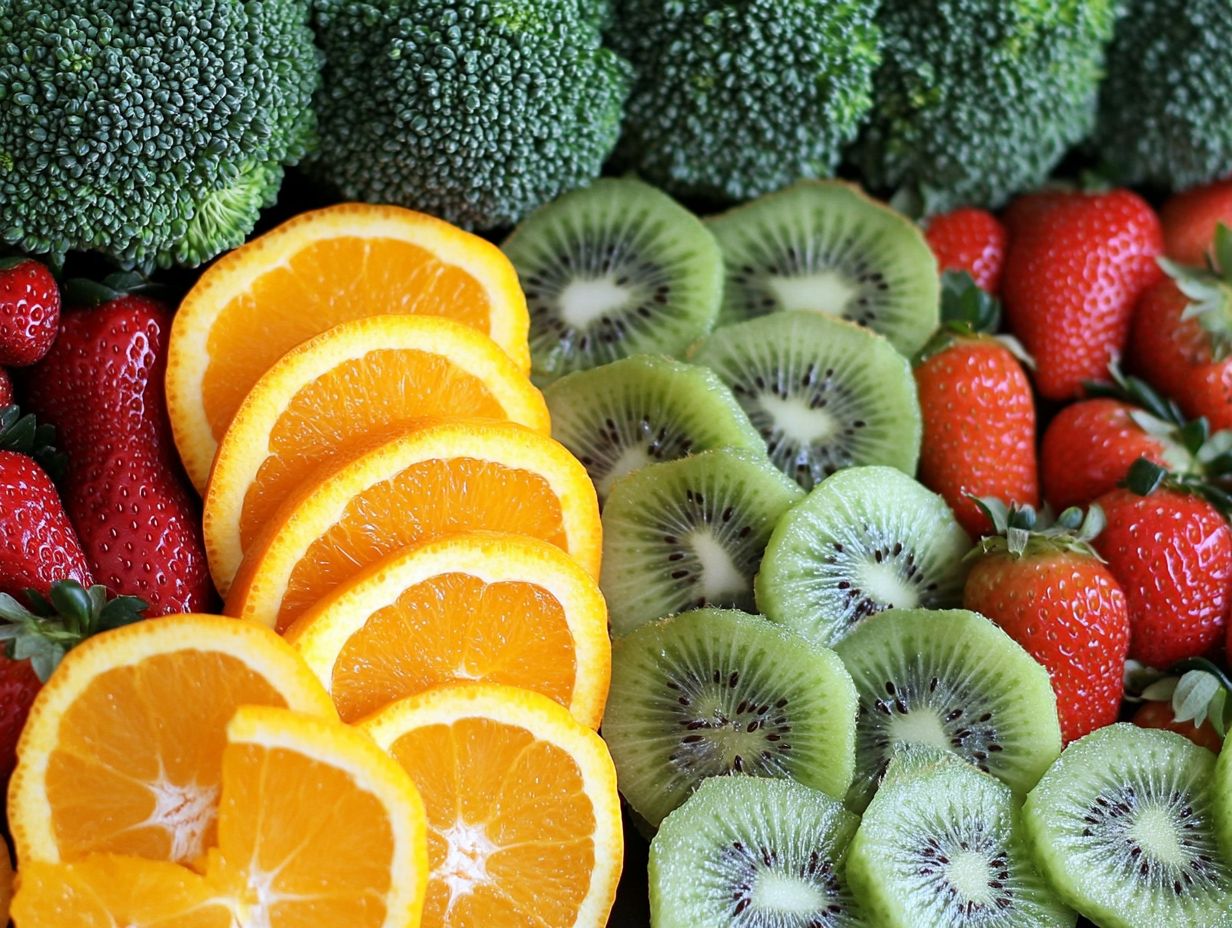
Incorporating 5 foods rich in Vitamin C, such as oranges, strawberries, kiwi, red bell peppers, and broccoli, can boost your immune system and help fight off illnesses.
The recommended daily intake of Vitamin C is important for maintaining a strong immune system and preventing health problems caused by lack of vitamin C.
Vitamin C has multiple benefits, including promoting healthy skin, aiding in iron absorption, and protecting against chronic diseases.
1. Oranges
Oranges, with their vibrant hue and refreshing taste, are among the richest sources of vitamin C. This essential nutrient plays a crucial role in skin health, immune function, and collagen synthesis.
This makes them a critical part of your summer skincare routine and overall health maintenance.
In addition to their impressive vitamin C content, oranges are also brimming with antioxidants, which help combat free radicals.
This benefit is particularly advantageous for maintaining youthful skin and enhancing its natural radiance.
Incorporating these delightful citrus fruits into your daily diet is a breeze. Whether you enjoy them fresh, blend them into smoothies, or use their zest to elevate salads and desserts, the possibilities are endless.
Their juicy segments can instantly enhance any dish, providing a refreshing burst of flavor while simultaneously supporting your immune system, especially during cold and flu season.
This is precisely why oranges deserve a prominent spot in your pantry.
2. Strawberries
Strawberries are not just a delightful treat; they’re also brimming with vitamin C and a host of health benefits.
They effectively combat free radicals and boost collagen production, which is essential for maintaining skin elasticity and overall well-being.
By incorporating strawberries into your diet, you can significantly enhance your antioxidant intake an essential factor in combating skin aging and promoting a radiant glow.
These vibrant berries are rich in anthocyanins and flavonoids, which provide protection for your skin cells against damage from environmental stressors.
To savor strawberries, consider these tasty options:
- Blend them into smoothies for a refreshing breakfast.
- Toss them into salads for a delightful sweetness.
- Enjoy them as a snack paired with yogurt or a sprinkle of nuts.
Their versatility allows you to relish their health benefits while tantalizing your palate.
3. Kiwi
Kiwi, a small yet nutrient-dense gem, is celebrated for its remarkable vitamin C content. This little powerhouse not only enhances immune function but also aids in vitamin absorption and promotes digestive health.
This vibrantly green fruit is brimming with dietary fiber and antioxidants, playing a significant role in overall wellness.
Its unique enzymes can support digestion, making it particularly advantageous for anyone aiming to maintain a healthy gut.
To effortlessly incorporate kiwi into your meals, consider these delightful options:
- Adding slices to a fresh salad for an unexpected burst of flavor.
- Blending it into a refreshing smoothie with spinach and banana.
- Using it as a topping for yogurt to enhance both texture and nutrition.
Its bright color and sweet-tart taste can elevate a variety of dishes, from savory salsas to delectable desserts.
Why wait? Start adding these vitamin C-rich foods to your meals now for a healthier, more vibrant you!
4. Red Bell Peppers
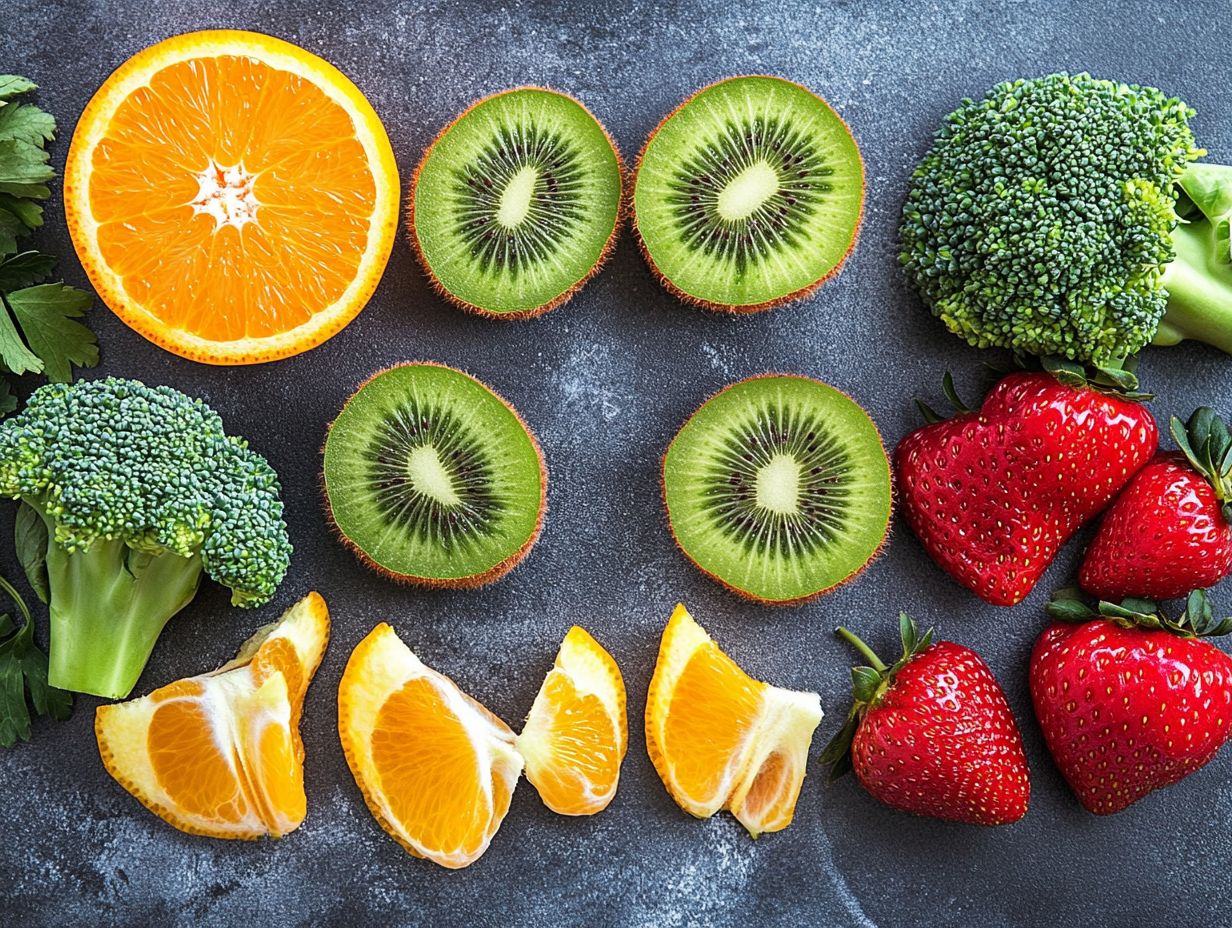
Red bell peppers are a powerhouse of vitamin C. Their vibrant color and crisp texture make them a delightful addition to any meal!
These colorful vegetables are rich in beta-carotene. This nutrient helps maintain youthful skin and reduces inflammation.
Incorporating red bell peppers into your diet is easy. Simply roast or saut them to preserve their nutritional value while enhancing their natural sweetness!
For a delicious twist, add diced red bell peppers to salads, stir-fries, or even blend them into smoothies for an extra nutrient boost. Their versatility across various recipes makes it effortless to enjoy these delights!
5. Broccoli
Broccoli truly shines as a nutritional powerhouse. It offers an impressive dose of vitamin C, essential for collagen production, which helps keep your skin firm and healthy.
This vibrant green vegetable also boasts a rich array of antioxidants that promote overall wellness. Lightly steaming broccoli helps retain its nutrients, while roasting unlocks delightful flavors without sacrificing health benefits.
For culinary enthusiasts, consider adding broccoli to stir-fries, soups, or salads for that perfect crunchy texture. With its versatility, broccoli enhances everyday dishes while boosting your vitamin intake!
How Much Vitamin C Do You Need Daily?
The recommended daily dose of vitamin C can vary based on age, gender, and lifestyle. Nutrition experts suggest adults target a daily intake of around 65 to 90 mg to prevent deficiencies and maintain optimal health.
Your individual requirements for vitamin C can be influenced by several factors, such as physical activity level, stress, and underlying health conditions. Athletes or those with higher physical demands may need more vitamin C to support immune function and tissue repair.
To ensure you meet your vitamin C needs, incorporate a diverse array of vitamin C-rich foods into your diet. Want to get your daily dose of vitamin C? Here are some delicious options:
- Citrus fruits like oranges and grapefruits
- Vibrant vegetables like bell peppers and broccoli
Aiming for at least five servings of fruits and vegetables each day is an easy way to stay healthy!
Why Is Vitamin C Important for Immunity?
Vitamin C is essential for your immune system’s strength. It boosts the production of white blood cells and serves as a powerful antioxidant, protecting your body from infections and chronic diseases.
This vital nutrient facilitates the growth and function of lymphocytes, a type of white blood cell that helps fight infections. Vitamin C also neutralizes free radicals unstable molecules that can damage your cells and contribute to inflammation.
Through its role in collagen synthesis, vitamin C helps maintain the integrity of your skin and mucous membranes, your body’s first line of defense. By supporting these mechanisms, vitamin C enhances your immune response and fosters overall health and resilience against illness.
Who Is at Risk for Vitamin C Deficiency?
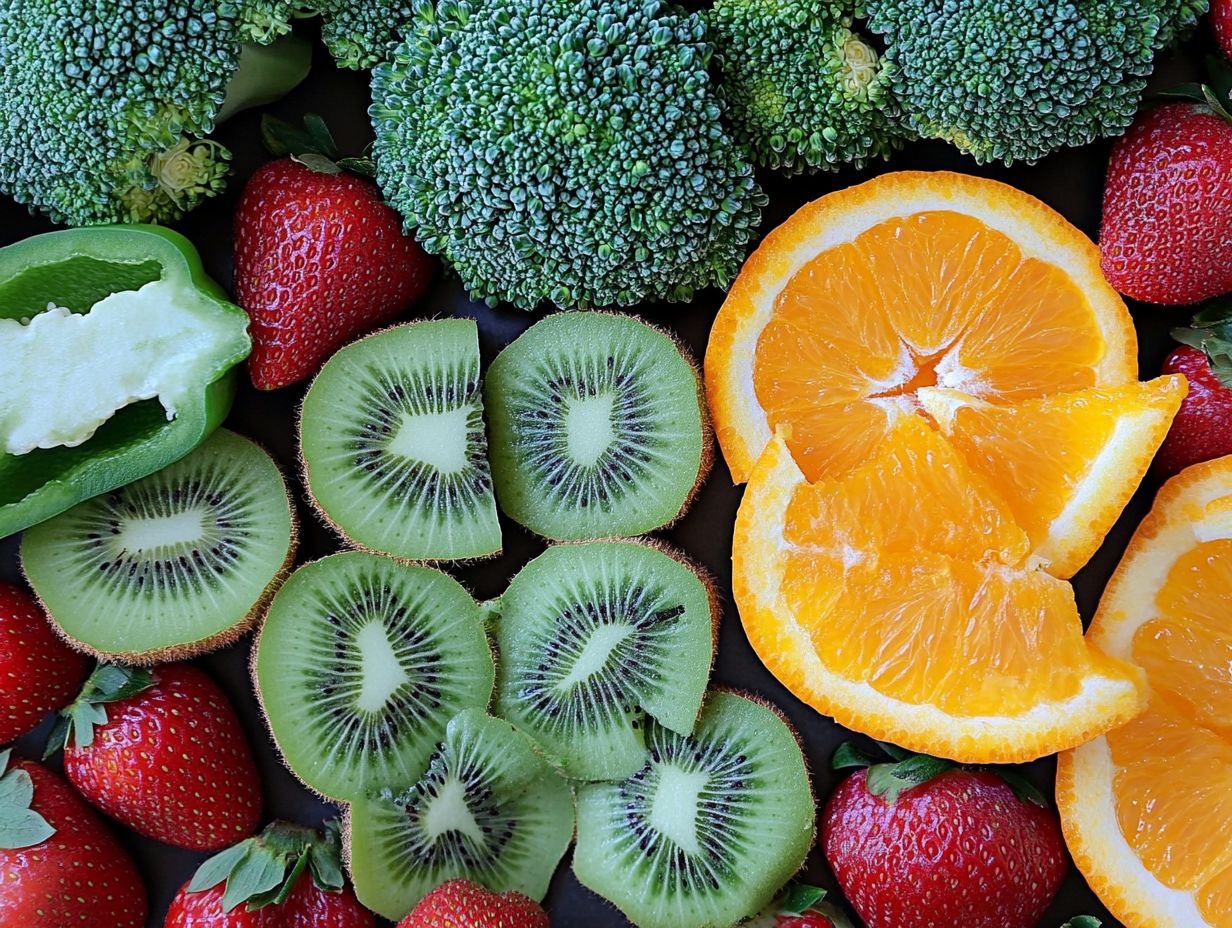
Certain groups of individuals, including those with limited access to dietary sources of vitamin C, smokers, and the elderly, face an elevated risk of vitamin C deficiency. A deficiency can lead to severe health issues, including scurvy and a weakened immune system.
If you have specific medical conditions, like diabetes or gastrointestinal disorders, maintaining adequate levels of this essential nutrient can be particularly challenging. Low vitamin C intake can severely impact your health. It affects skin health, wound healing, and increases the risk of infections.
To counteract these deficiencies, it’s vital to include a variety of vitamin C-rich foods in your diet. Consider adding:
- Citrus fruits
- Strawberries
- Kiwis
- Bell peppers
- Leafy greens
If you struggle to get enough vitamin C from food, especially if you are in a high-risk group, consider using vitamin C supplements.
What Are the Other Benefits of Vitamin C?
Vitamin C is also essential for skin health. It plays a crucial part in collagen production and wound healing, showcasing anti-inflammatory properties that contribute to your overall well-being.
Research indicates that vitamin C can significantly diminish the appearance of fine lines and wrinkles by enhancing skin elasticity and hydration. A 2017 study published in the Journal of Clinical and Aesthetic Dermatology found that individuals with elevated vitamin C levels enjoyed a marked improvement in skin texture and a reduction in signs of photoaging.
Its anti-inflammatory benefits can also assist in managing conditions like acne and rosacea, paving the way for clearer skin.
Experts recommend adding vitamin C-rich foods to your daily meals. Think oranges and bell peppers. By doing this, you ll nurture a healthier body and cultivate a radiant complexion.
How Can You Incorporate These Foods into Your Diet?
Incorporating vitamin C-rich foods into your diet is both simple and delightful. Fresh produce like oranges, strawberries, and broccoli can seamlessly enhance your meals through various cooking methods and flavorful recipes that promote healthy eating.
Start by tossing a handful of strawberries into your morning smoothie. You can also experiment with vibrant salads featuring bell peppers, kiwi, and a zesty citrus dressing.
For lunch, consider lightly roasting broccoli with a sprinkle of garlic. This not only elevates the flavor but also preserves its nutrient profile. Meal prepping can be a breeze, too slice up some oranges for a refreshing afternoon snack or whip up a vibrant salsa with diced tomatoes, avocado, and lime to accompany your dinner.
Follow these tips to easily enjoy delicious vitamin C-rich foods every day. Your health will thank you!
What Are Some Delicious Recipes Using These Vitamin C-Rich Foods?
Delicious recipes that incorporate vitamin C-rich foods can elevate your meals into nutrient-dense delights. Imagine showcasing ingredients like kale, guava, and bell peppers while promoting healthy eating habits and overall wellness.
These vibrant foods are not just bursting with flavor; they re also packed with antioxidants compounds that protect your cells from damage that support your immune system and enhance skin health.
For breakfast, why not whip up a bright smoothie featuring guava? It adds a tropical twist and boosts your energy levels.
At lunchtime, treat yourself to a refreshing kale salad topped with bell peppers and a zesty citrus dressing to lift your mood and sharpen your cognitive functions.
For dinner, consider a stir-fry with broccoli another fantastic source of vitamin C that delivers essential nutrients alongside a satisfying crunch.
And don t forget about snacking; munching on slices of kiwi or orange can keep those cravings at bay while flooding your body with vital vitamins throughout the day.
Frequently Asked Questions
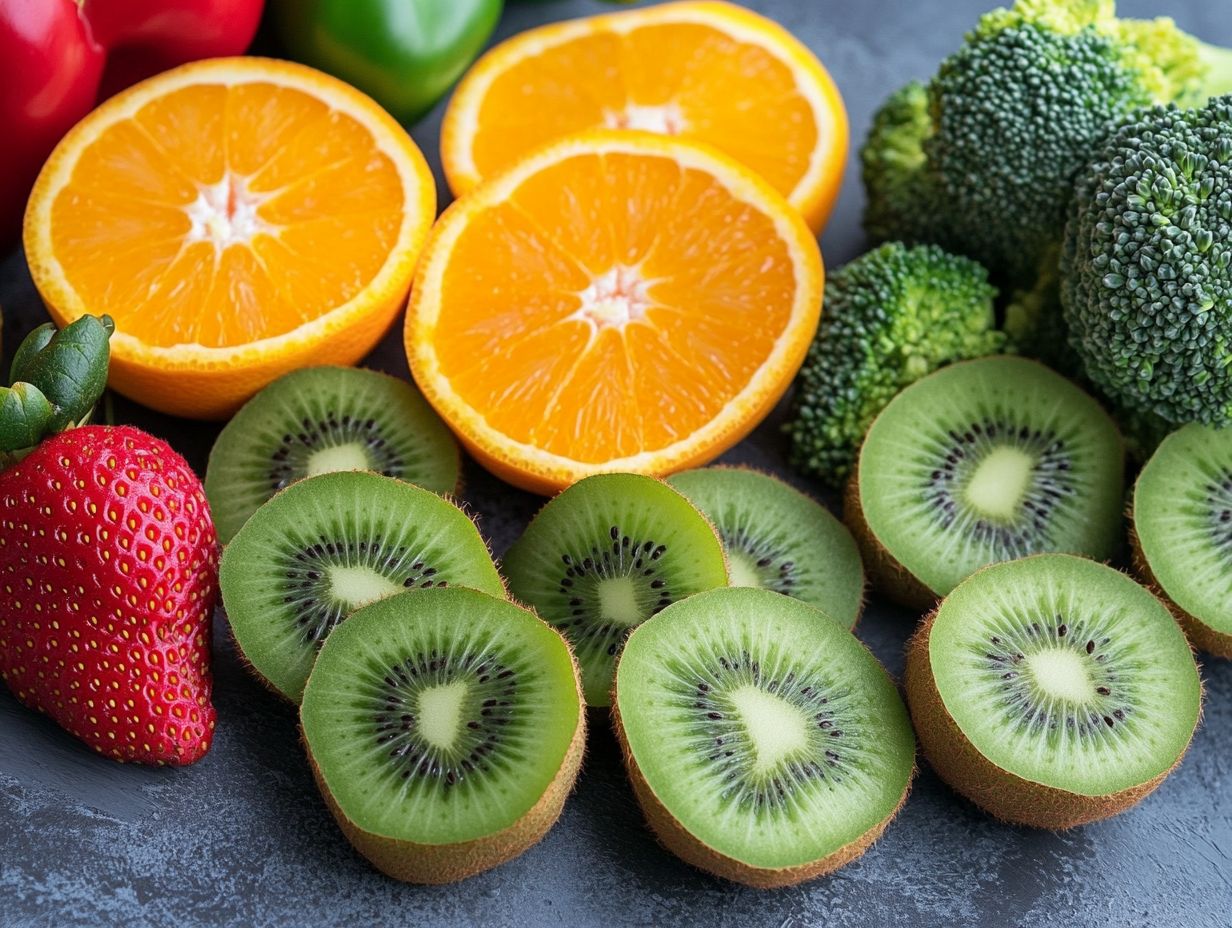
What are five immune-boosting foods rich in vitamin C?
Here are five foods that boost your immunity with vitamin C: oranges, strawberries, kiwi, bell peppers, and broccoli, along with top foods rich in zinc for immune support.
How does Vitamin C help boost the immune system?
Vitamin C is a powerful substance that helps produce white blood cells and antibodies. These are essential for fighting infections and diseases.
It also protects cells from damage, aids in wound healing, and enhances iron absorption.
Can consuming Vitamin C-rich foods prevent colds and flu?
Vitamin C can boost your immune system, but it doesn’t guarantee prevention of colds and flu.
Studies show that regular Vitamin C consumption can reduce the severity and duration of these illnesses.
Are there other benefits of consuming foods rich in Vitamin C?
Yes, Vitamin C promotes healthy skin and improves heart health.
It aids in collagen formation and has protective properties against chronic diseases.
How much Vitamin C should I consume in a day?
The recommended daily intake is 75 mg for women and 90 mg for men.
If you are pregnant or breastfeeding, you might need more. Consult with your doctor to determine your needs.
Can I take Vitamin C supplements instead of consuming Vitamin C-rich foods?
While supplements can be helpful, it’s best to get nutrients from whole foods. These foods contain other essential nutrients that work together for optimal health.
If you can t get enough Vitamin C from your diet, supplements can be a good alternative. Start incorporating Vitamin C-rich foods into your meals today for better health!

